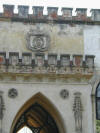8th Dragon Regiment

"Prince Saint Václav" (in Pardubice), his name to colaps Austro-Hungary was 13th Dragon Regiment Montecucolliserved only officers and cadets of nobility. In thoose tradition regiment continued in existention 1st Czechoslovakrepublic, but served here military prezention service in Reserve Cavalry Officer’s School in Pardubice (ŠDZJ) too sons of big businesmans and highest state functionars. Near occasion Saint-Wenceslas milenium in the 28.09.1929 under sculptor of Saint Wenceslas in Prag to give standarde for 8th Cavalry Regiment. Of this times to have name 8th Dragon Regiment of Prince Saint Václav. For service in him was make demands on a to, but frekventantes of very reach familys to have already as boys private teachers ride with horse, was exelently riders.
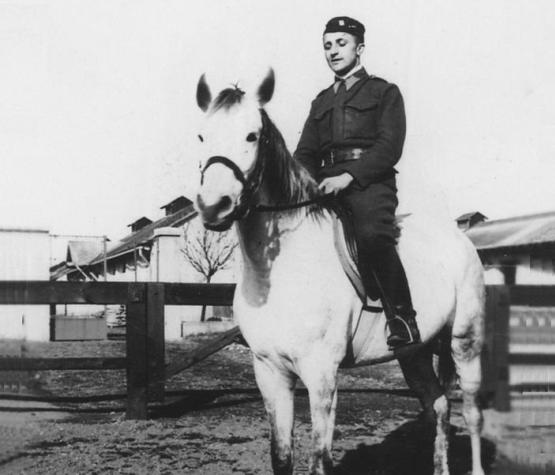
Winner of the three-day equestrian events Pardubice Sergeant aspirant cavalry Aladár II. Ondrejkovič Liber Baro Sandor de Szlavnicza, 8th Dragon Regiment St. Wenceslas in Pardubice.
In Reserve Cavalry Officer’s School in Pardubice (ŠDZJ) of Slowakia was only one, which ago demonstrated his higest riders knowlidge and whom one time societys ancestry him to so service predestined. One of them was Pfc aspirant of cavalry Aladár II. Ondrejkovič Freiherr Sandor de Szlavnicza, after rehabilitation in the 1991 Lt. colonel tank. Aladár II. Ondrejkovič.
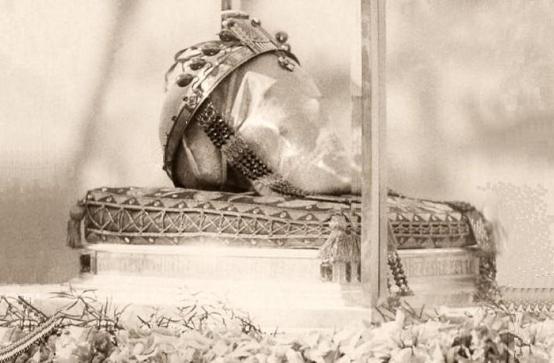
On the occasion of the Millennium 28/09/1929 exposed crown jewels and was first publicly exposed the remains of Prince Saint Wenceslas. President of the Supreme Court, former Minister for Slovakia, Comes of Tekov-Nitra county, Professor UK, Vice boards and shareholder firm Baťa, cement Ladce and Lietavská Lúčka, his Excellency Dr. Martin Mičura. He was also Chairman and Members of Czechoslovak Peoples Party in Slovakia and the father birmov of Aladár Ondrejkovics. With his brother, Tibor took to the Vyšehrad and the temple of St. Vitus car Horch in one thousand years opportunity since the death of St. Wenceslas. Both brothers received from him a commemorative gold medal minted on the occasion of St. Wenceslas millennium.

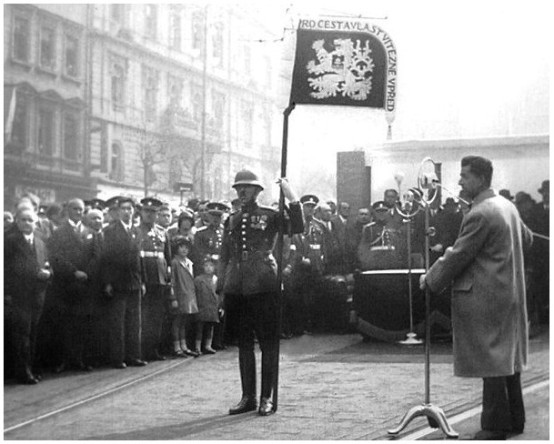
Saint Wenceslas milenium in the 28.09.1929 under sculptore of Saint Wenceslas in the Prag. The Standard 8th Cavalry Regiment, which took his commander Colonel cavalry Josef Koutňák, Captain Czechoslovak legions 1918-1920 commander of the 1st Squadron of Czechoslovak cavalry regiment in Russia in Siberia.
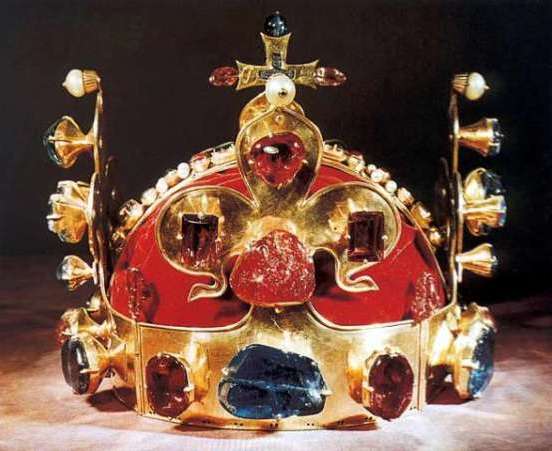
St Wenceslas, Duke of Bohemia,
our prince, pray for us God, the Holy Spirit!
Christ, eleison.
You are the heir of the Czech lands, remember its breed,
perish forbid us her future, St Wenceslas!
Christ, eleison.
We ask your help, have mercy on us,
Reef sad Zazen all evil, St Wenceslas!
Christ, eleison.
They are adding additional staff
Courtiers heaven is a beautiful, happy is he who is there,
in eternal life, the Holy Spirit of fire clear.
Christ, eleison.
Mary, Mother of desirable tys Queen Almighty,
you ask for us, as Christians, His Son, the Lord!
Christ, eleison.
Holy angels of heaven, please, go bring us together,
where there continues to praise the eternal God.
Christ, eleison.
All Saints, just for us, we perish Do,
You holy, Holy Norbert, Holy Sigismund, Holy Prokop,
Holy Vojtěch, Holy Jan Nepomuk, St. Ludmila, St. Agnes,
St Wenceslas!
Christ, eleison.
God the Father praise surrender, the Holy Cross is bless:
In the name of the Father and the Son and the Holy Spirit.
Christ, eleison.
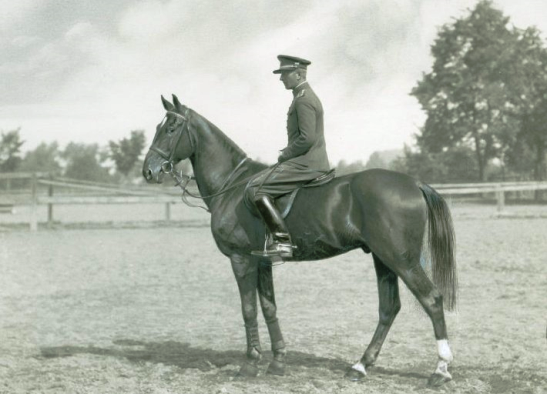
Teacher of Reserve Cavalry Officer’s School (ŠDZJ) in Pardubice First lieutenant of cavalry František Ventura (*13.08.1894 Vysoké Mýto † 01.12.1969 Prague) and his horse Eliot. Maybe it is not yet forged the success of First lieut. cavalry František Ventura and horse Eliot in the summer Olympic game in the year 1928 in Amsterdam. The duo brought republic thoose gold medal in jumping. Was valuable because it is in the Amsterdam meet all concur of land, represented primarily cavalerists - officers off horse weapen. In all land was horse rapid means of transport. Riders could therefore choose sports material.

Although the number of graduates of the Military Academy increased gradually in the following years, the number of graduates of Slovak nationality did not change and decreased in percentage terms. In 1938 it significantly contributed to the limited combat ability of the Czechoslovak army.
On January 30, 1933 in connection with the situation in Germany to adopt the commander of the Czechoslovak army general Jan Syrový and commander of the French army general Maurice Gamelin Poland is planning the joint attack of Czechoslovak armies from Dečín to Lusatia and Poland from Poznan to the Oder. In Cottbus be merged to conclude surrounded by the German army in Silesia. After their capitulation should jointly attack on Berlin. The plan was negated when on January 26, 1934 in Berlin was closed German-Polish non-aggression pact (German-Deutsch Polnischer Nichtangriffspakt), known as the Hitler-Pilsudski pact (German-Hitler-Pilsudski pact), full name Declaration between Germany and Poland not to use violence (German Erklärung zwischen Deutschland und Polen auf über den Verzicht Gewaltanwendung), a non-aggression treaty was concluded between Germany and Poland. Contract signed for 10 years foreign minister Konstantin von Neurath free man, a Polish ambassador in Berlin, Józef Lipski. Rejecting the use of violence, it was not accompanied by a guarantee of immutability of borders, it admitted the possibility of its use in revising the territorial statusquo third countries. The contract did not contain an article on the conditions for suspending its validity and just one of the parties to reject it if the other party finds itself at war with a third country.
The contract had a secret articles, assumed military and diplomatic cooperation against the Soviet Union. Plans of both countries the division of Ukraine (Poland had achieved the Black Sea) and the Baltic republics (Lithuania had in Poland, Latvia and Estonia Germany). The Parties were situated disagree over - the division of Czechoslovakia (Polish dictator Pilsudski and his foreign minister Beck claimed that Czechoslovakia is a non-viable artificial bodies), according to their plans should the Polish case the Czech part of Teschen, Slovakia and Ruthenia should be returned to Hungary with which Poland like to have to have a common border.
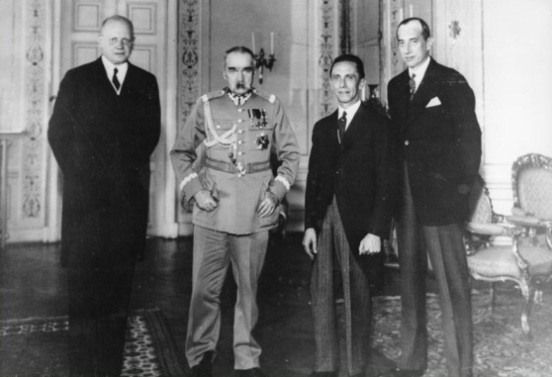
Hans-Adolf von Moltke, Józef Piłsudski, Joseph Goebbels and Józef Beck (1934).
Treaty normalize German-Polish relations, burdened by German revisionism to Treaty of Versailles (le Traité de Versailles). Enclosing the contract has negated the possibility of joint military intervention by France, Czechoslovakia and Poland against Germany in the event of a crisis. Award of the contract allowed the mobilization of Polish foreign policy against Czechoslovakia, to which Poland had territorial demands. Reinsurance treaty with Germany, the Poles expelled 13 September 1934 by the Assembly of the League of Nations in Geneva Treaty on the Protection of National Minorities (it was a violation of the Declaration of Nations and the Treaty of Versailles) - to increase the oppression of national minorities in Poland (Russians, Ukrainians, Czechs (of Těšín and Volyň), Lithuanians, Romanians, Germans and Jews). When leaving from Geneva on Sept. 28, 1934 Foreign Minister Beck declared: "Poland declares that henceforth combine their fate to the fate of Germany. The Polish Government declares for free from any obligations to Czechoslovakia and reaffirms its objective to have a common border with Hungary. "
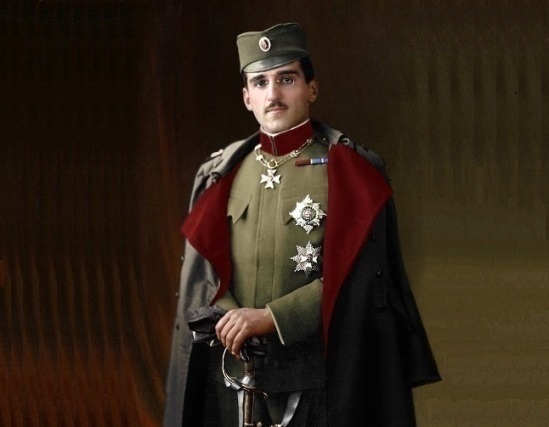
King Alexander I of Yugoslavia. The assassination of Alexander I. on October 9, 1934 in Marseille was a key factor and tragically influenced the future of the Small Agreement and the whole of Europe. In favor of the Small Agreement, Slovak evangelical intelligence was also involved around JUDr. Martin Mičura associated Catholic personalities. Andrej Vrbacký, editor of the People's Newspaper of Brno in Beograd, a member of the Yugoslav-Czechoslovak League, born in the United States, was to 1941 by the Yugoslav citizen, holder of the prestigious Prize of the Center for the Yugoslav PEN Club. The official of the Czechoslovakia-Yugoslav League was his future son in Law of Administrator Teacher Stefan II Ondrejkovič. In 1925 Crown Prince Carol II. Romanian acted in Topolčianky with President T. G. Masarik, JUDr. Martin Mičura, also met with representatives of the district of Zlaté Moravce.
The changed situation in 1934 in Central Europe as opposed to trivializing Minister Dr. Eduard Beneš immediately reacted very sensitively Slovak political parties. The Hlinka People's Party has deepened distrust of the central government in Prague. Czechoslovakian orientated Slovak political parties pressed the government in Prague to strengthen the defense capability of the state and speeding deployment to strategic and defense industries to Slovakia together with their children by entering into the officer corps Czechoslovak Army. Accordingly acted consistently Ondrejkovič family, her son Aladár II after the performance of military service entering another active service.
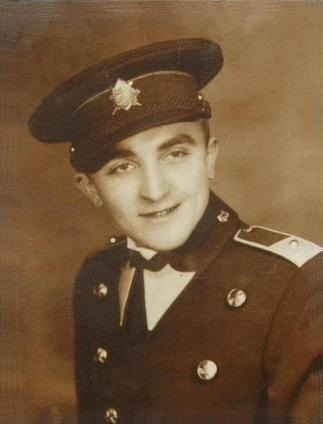
The then 2nd lieutenant of cavalry Aladár Ondrejkovič pointed out that the strength of Josefov, which was presented in 1934 to perform military service was the best rider regiment. After transferred to the Reserve Cavalry Officer’s School (ŠDJZ) in Pardubice was only average.
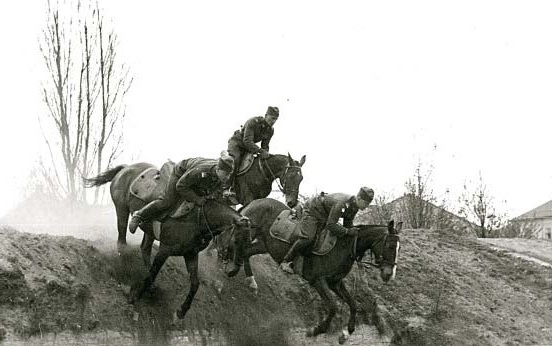
He had to catch up until the end of school in 1935 became the winner of the Great Pardubice military. Home grown rides, the countryside was his father Stephan Ondrejkovič-Sandor, school administrator and teacher. They own their horses and bareback Aladár II. as a boy in Trebatice riding sail into the river Váh. Remont squadron replacement banners of 8th Dragoons Regiment crew was outside Pardubice deployed since September 16, 1933 in Josefov.
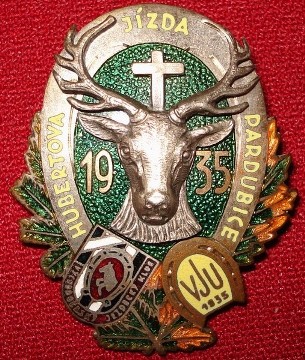
Even as a sergeant aspirant cavalry, 2nd lieutenant of cavalry advance further in active service Aladár II. Ondrejkovič won the horse race organized by the eastern Czech equestrian club and VJU Pardubice (Hubert's ride).

Photo of 2 March 1935, shows a military trainees Farriers course. An in Brno and passed it selected members hypomobile regiments of Czechoslovak Army.
In the year 1935 was a platoon commander of ŠDZJ in Pardubice Lieutenant of cavalry Július Nosko. Trainees of this school were also Jan Machník son of Czechoslovakian Defence Minister František Machník, nephew of Director General from Živnobanka young Preis, young Schicht,
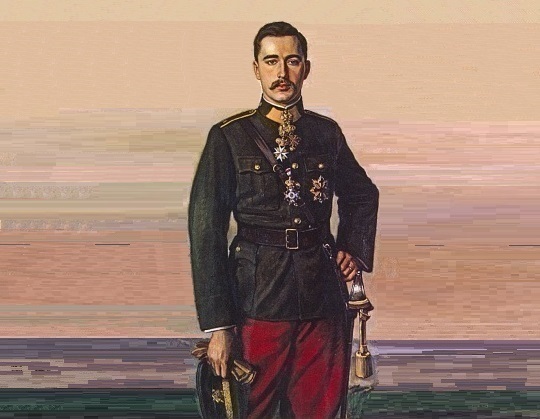
Prince František Schwarzenberg, Prince Karel Schwarzenberg, Prince Jan Thurn-Taxis, Count Jan Dobrženský from Dobrzenicz, but also Jaromír Nechanský and
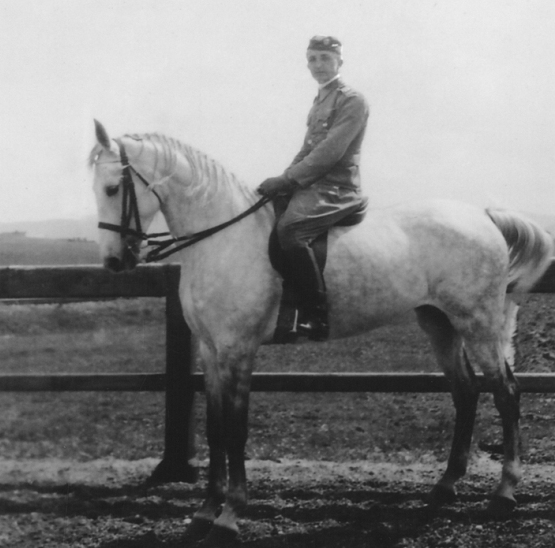
sergeant aspirant cavalry Aladár II Ondrejkovič Liber Baro Sandor de Szlavnicza, winner of the three-day riding ride of the Military Steeplechase.
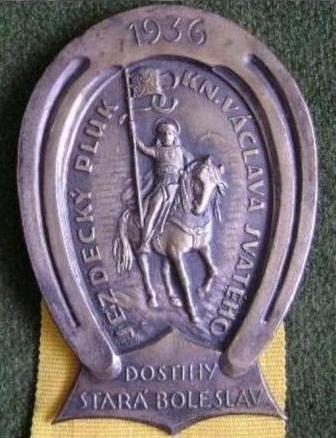
To the sergeant aspirant cavalry Aladár II Ondrejkovič young Schicht remindet without envy ,,Ali you it thats why, because you have hungarian blood ".
As aspirants could not even carry on a walk into town saber vz. 24 hung from the waist, but big saber vz. 4, which kept armpits. On horseback riding, the saber vz. 4 was suspended on the saddle for its length..
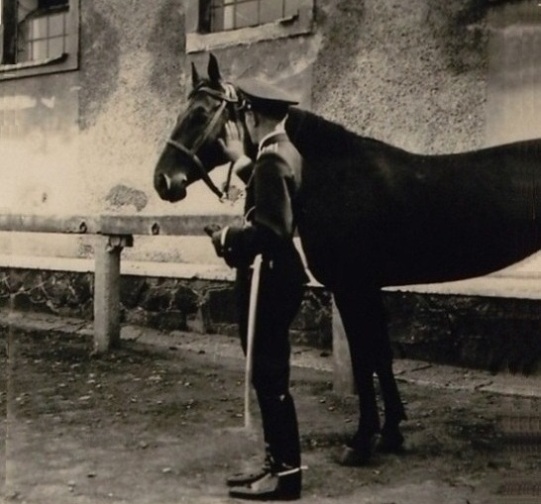
A special chapter was the demand for uniform equipping and behavior of aspirants and young officers cavalry in the company.

Uniform and jackboot be able run up only with specialy most renowned taylor and shoemaker, chimmer. Opposite price wie jodhpurs 900 Kč and jackboot least 800 Kč de facto not was novbody in state capable fulfill demandet shirt and quality. In addition, the requirement was, the cavalry officer, had two private horses.
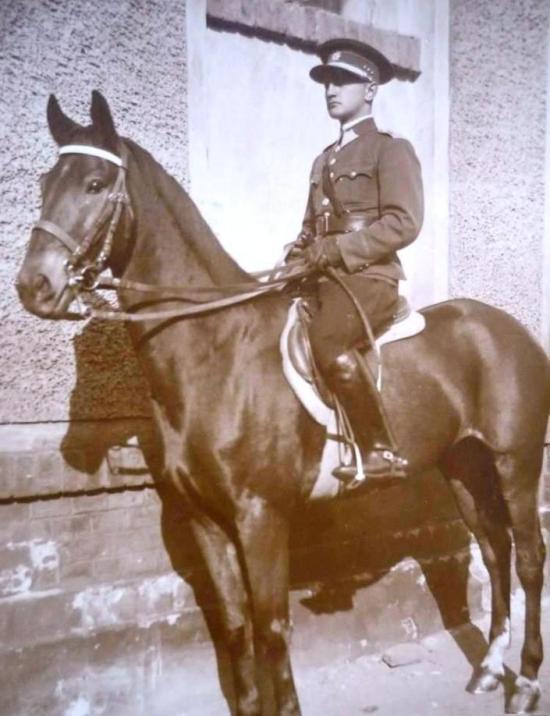
The cavalry officer spent six hours a day in the saddle. He could not be blamed for colleagues and commanders, so he had a quality horse himself. A horse, a good quality half-breed intended for a radial service, would not withstand the burden.
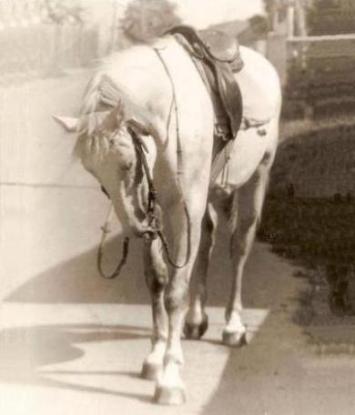
In fact, even a horse from the best breed could not be driven every day. After a six-hour drive he needed 48 hours of rest.
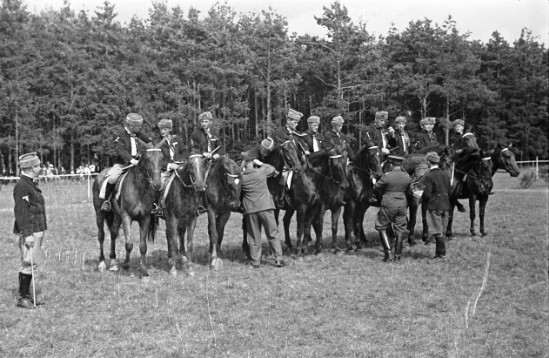
In sandy Dragoon officers exercise Farmers riders, which was composed mostly of farmers privilege midle state agrarian. There was no other way for them to demonstrate professionalism and most knowlidge riders officers. In Saturday enving after exercises organized agrárians of their families, entertainment, society, which had Dragons demonstrate their level of society. Payment for young lieutenant of cavalry was the most 900kč per month. The above cost countries with particular pride of his parents.
_____26[1].60507_223406_23.jpg)
Shaghya. Requirements Czechoslovak Army dry was constitutional tough horse. To compare dry well wiry, more durable type of man. Extra requirements Czechoslovak Army was too for future family live Youngs officers. His future wife must have big dowry and a corresponding family origin and nationality.
According to the regulations permit A-XIV, to marry "published relevant provincial officers of arms and officers of Headquarters of the General Staff of MND.
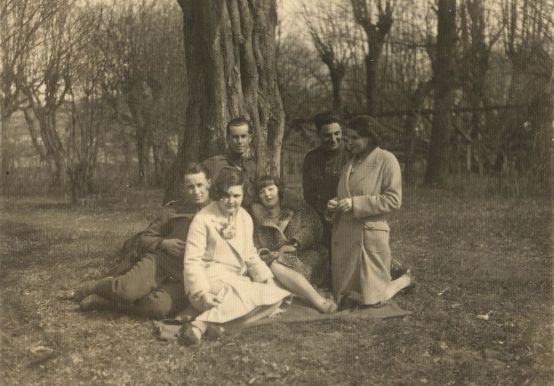
Both groups Officers had set conditions: age 28 years, the political reliability of the spouse, at least secondary education fiancee and her Certificate of health information. Pre officers of arms was designed recognizance (veno spouse) of EUR 50 000 Kč, double room furniture in the flat and trim. For officers of the General Staff's bail was 100 000 Kč, furniture to triple room flat and trim.
When it intends to marry young officer, was required to submit all required dokuments the future wifes and his familys maryd committee composed of officers oldest regiment. If wedding Commission rejected his request for permission to maryd and when the mean nevertheless marry, yet another path for him as out of army. Nevertheless, mali Dear family have a big interest burden officer. Maried his dughters with him, all his family grew in societys ladder. Dowry them back to second form. Officeres was not allowed in uniform carry bagage and go by tram. When the train arrives, wait him militarys ordonace bagage and he won. Railway station to wait him come military carriage, or car. Evry was the duty of whites wearing gloves. Even in the fifties was a condition of participation in olympic game of discipline military officers rank.
Lieutenant of cavalry Aladár Ondrejkovič Liber Baro Sandor de Szlavnicza, victor of the Military Steeplechase Pardubice served under regardfuly controle his protectors and garant in Czechoslovakian Army. It was Major gst. Alojz Androvič of 2nd department Headquarters in Prag (Group A study and planning, Hungarian Section), his related of two sides, after mother too fathers. Of family was to (round the year 1865 Main Noble Judge in Púchov (processus/ reambulatio, szolgabírói járás) Alexander Androvich de (Androvics, Androvič) †26.12.1879 Trenčín. Major Alojz Androvič have son and daughter. His son *1919 MUDr. Alojz Androvič - Ali Androvič-Vážsky superintendent of Neurologic clinic in Trnava and poet (literary direction catolic modern) issued a collection of poems ,, Letter to Catarine ". After the year 1968 performed medical practice in his especiality in the Swiss in Bern, was search with patients off all new homeland. Daughter of Colonel Alojz Androvič Lady Elenka Andorovičová maried Švančarová lives in Bratislava.
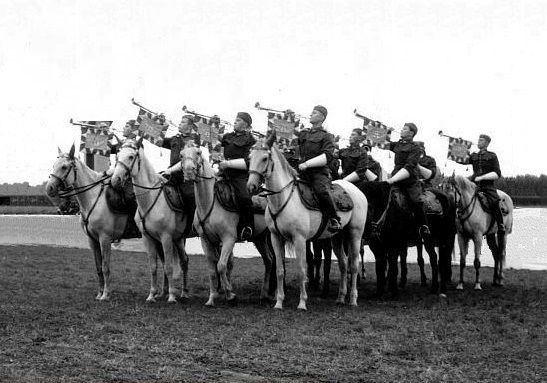
Tugs of the 8th Dragons Regiment "The Prince of St. Wenceslas" in Pardubice in the second half of the 30's of the 20th century.
In 1936 he performed the Cpt. DVM. Mikuláš Ferjenčík served at the Riding School in Pardubice as Chief Veterinarian. He managed to receive remotes from eastern Bohemia and worked with a stallion in Kladruby nad Labem. At the MRS in Pardubice, he met also with Lieutenant cavalry Aladár II Ondrejkovič and František Schwarzenberg. As aspirants, they were the specialists who led and were their rivals in the race. In 1936, he sailed the kpt. DVM. Ferjenčík main race of the Great Pardubice steeple-chase on the mare - Race Dodosa (born 1930). However, the race did not finish. In Pardubice Lieutenant cavalry Aladár II Ondrejkovič also achieved the best results in Park Jump.
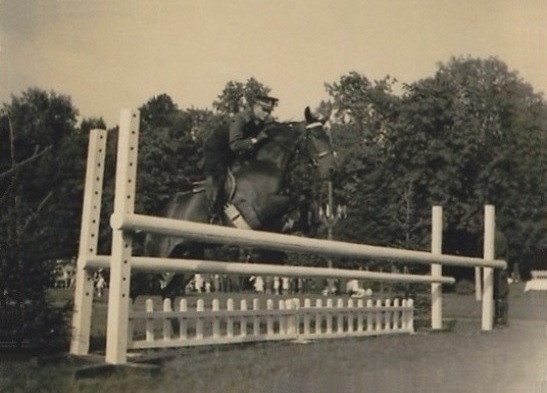
Leaders of 8th Dragon Regiment :
Col.cav. Zdeněk Chlapec (octobre 1920 - february 1921)
Lieutn-col. cav. Ludvík Melzer (february 1921 - október 1923)
Col. cav. Alexander Nemanský (octobre 1923 - apríl 1928)
Col gst JUDr. Josef Koutňák (apríl 1928 - september 1928)
Mjr cav Josef Buršík (september 1928 - march 1929)
Lieutn-col. cav Julius Fišera (march 1929 - september 1929)
Col gst JUDr. Josef Koutňák (september 1929 - december 1930)
Lieutn-col. cav, of januar 1934 Col. cav. Karel Ševčík (december 1930 - octobre 1935)
Col. cav. Vladimír Hobza (oktober 1935 - january 1936), (október 1935 – september 1937) after Lieutn-col. gen. št. respektive Col. cav. Josef Tacl.
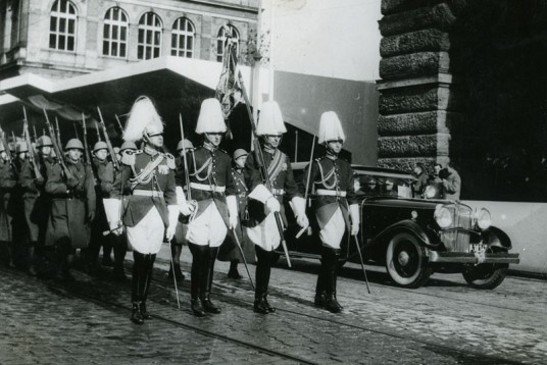
Romanian Royal Guard escort of King Carol II of Romania during his state visit to Czechoslovakia. In Prague, 28 October 1936 at a military parade marched at the head of Infantry Regiment Prague garrison. President of the Republic Dr. Eduard Beneš donated a special Skoda private car with unbreakable glass to the Romanian king. Fr. Ringhoffer, Chairman of the Board of Management of Tatra-Ringhoffer, donated to the King a large 12 cylinder car Tatra, which is in this photo. The military parade in Bratislava received the Lieutenant cavalry Aladár II. Ondrejkovič for balance sheet presentation riding king Preview 01/11/1936 Romanian military decoration.
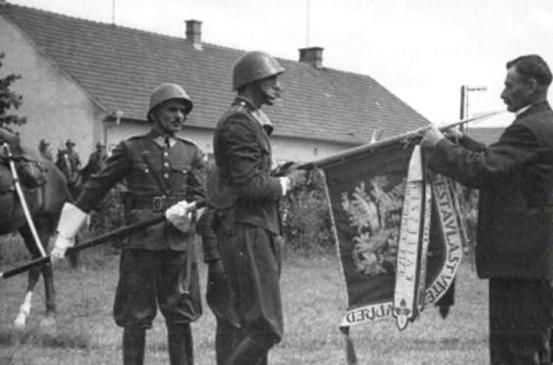
Sabre vz.4 wore dragons for its length hanging on the saddle with your haunt aspirants school for cavalry officers in ambush under his arm. From October 16, 1936, lieutenant Aladár Ondrejkovič performed a voluntary service at the 11th Dragons Regiment in Bratislava.
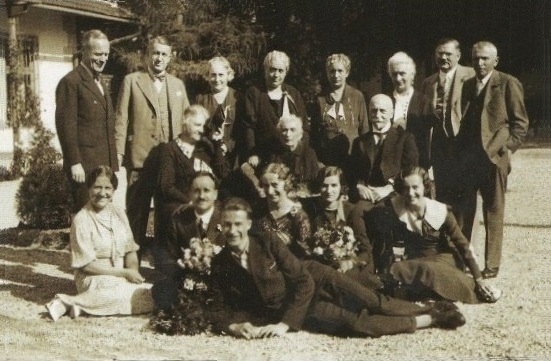
Snímok z oslavy 80-tych narodenín Olgy Milecovej v Troch Dvoroch. Zľava stoja diplomat Dr. Ivan Milec (Milecz de Tarnó), bankár Igor Pietor, Janka Thomka-Markovická, Oľga Kuzmányová, Hela Kohútová, Margita Paulíny-Tóthová, bankár Andrej Bacher, statkár a zeman Ladislav Thomka-Markovický. Zľava sedia Elena Makovická rod. Pivková, Oľga Milecová rod. Makovická a bankár Vladimír Makovický. Na zemi sedia zľava Eda Bacherová rod. Milecová, vysokoškolský pedagóg a lekár MUDr. Ilja Paulíny-Tóth, Anna Pietorová rod. Milecová, Milena Milecová rod. Slezáková, Tatjana Pietorová. Vpredu leží Igor Pietor ml.
Horse races of the armies of the "Little Agreement" for the silver cup of His Majesty Carol II, King of Romania, took place in Pardubice on 12.IX.1937 at the famous race track. The team consisting of riders from the battalion of the Equestrian Academy won. On the eve of the races, the birthday of the Yugoslav king Petar II was mentioned in the town hall.
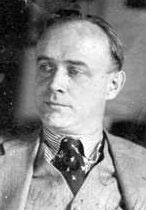 Respected partner and dreaded rival for World Central Intelligence was Colonel gen.staff František Moravec, head of the 2nd HQ Czechoslovakian Army. He was directly superior Major general staff Alojz Androvič 2nd Chief of Staff in Prague. Mjr gst. Alojz Androvič was one of three majors off GST. with slowakian nationality in thoose ranks in the then Czechoslovak Army. Colonel F.Moravec departed day 14.march 1939 cross Germany with aeroplane Dc-2 of company KLM with ten high inteligence officers eight hours for ocupate Prague with Wehrmacht.
Respected partner and dreaded rival for World Central Intelligence was Colonel gen.staff František Moravec, head of the 2nd HQ Czechoslovakian Army. He was directly superior Major general staff Alojz Androvič 2nd Chief of Staff in Prague. Mjr gst. Alojz Androvič was one of three majors off GST. with slowakian nationality in thoose ranks in the then Czechoslovak Army. Colonel F.Moravec departed day 14.march 1939 cross Germany with aeroplane Dc-2 of company KLM with ten high inteligence officers eight hours for ocupate Prague with Wehrmacht.
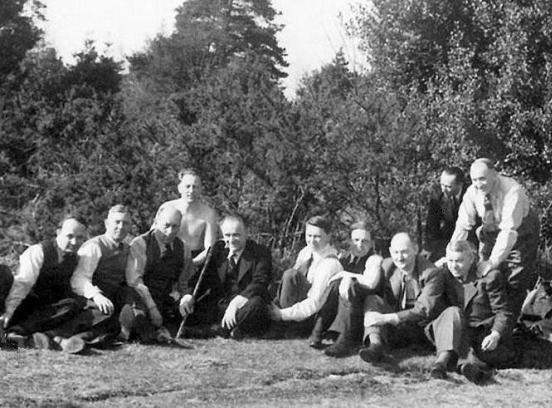
It was Lieutenant-colonel Oldřich Tichý, Mjr Emil Stankmiler, Mjr Jozef Bartík, st.Cpt Jaroslav Tauer, st.Cpt František Frič, st.Cpt Jozef Fort, Mjr Alois Frank, st. Cpt Václav Sláma, st.Cpt Ladislav Cigna and st.Cpt Karel Paleček. The same day Major of general staff Alojz Androvič traveled for his challenges to Slowakia.
To this relationship Slovak Army and leader of diplomation through 2nd staaf HQ Slovak Army - Mjr infantry Alojz Androvič after 14 march 1939 against German empire's interest immediately followed.

The Alliance Romanian kingdom's commitment to Czechoslovakia in the years 1938 clearly expressed its position too positive leader Militaty his Secret Service in the years 1924-40 Mihail Moruzov Serviciului Secret de Informaţii militar al României. Mihail Muruzov (Siguranta) * 1887, com. Tulcea † 1940 Jilava, nationality Lipovan. At that relationship Slovak army and diplomacy through Chief of 2nd Staff of the Slovak Army - Major infantry Alojz Androvič after March 14, 1939 against the interests of the German Reich immediately established.
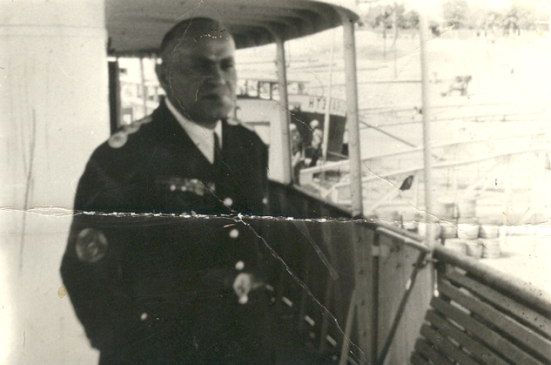
Son of an Orthodox priest, Commander - Directorul of SSI Mihail Moruzov the Danube port of Tulcea.
_____k__pia_____k__pia_____paolus_023.30706_231702_23[1].10410_094956_23.jpg)
Captain Alfonz Lošonský and Surveillance officer of Regiment Lieutenant of cavalry Aladár II. Ondrejkovič Liber Baro Sandor de Slavnicza.
On April 28, 1939, Germany terminated the treaty unilaterally after Poland refused the border adjustment requirements in German favor (the Gdansk corridor). As the official reason, the German side referred to the Polish-British communiqué of 6 April 1939 on granting British guarantees for Gdansk. The denunciation by Germany meant the construction of Polish foreign policy over the past 5 years. This policy helped destroy Czechoslovakia, break the Palestinian Agreement, weaken the position of France in Central Europe, and bring the world to war. The fate of Czechoslovakia, with which Polish Foreign Minister Józef Beck worked so hard, became Poland's destiny.
In the campaign August 29 - September 24, 1939 Commander of Lieutenant cavalry Aladár Ondrejkovič was Major DVM. Mikuláš Ferjenčík.
In the April 1940 was executed in Romania, two Germans agents. SSI leader - cheaf Mihail Moruzov 27.november was executed in 1940 in the Jilava prison after abdication from King Carol II and the day raised 04.09.1940 dictatorships in Romania, General Ion Antonescu. Romania acted opposite OKW German Abwehr - Abteilung III, F3, Abt.II 1 OS, Abt.I / M Ost-Sud, Abt.I Luft / AO, Abt.I / P / Ost. OKW confidant in Bucharest was Mjr v.v. Urluzianu. Conect maintained with him through the German embassy in Romania, through the Head office Blücher. Even if the major was Urluzianu retired Ministerium worked on defense. Submitted reports on the organization of the Romanian army and plans taking opossite Ungarn, for the case of war between Romania and Hungary.
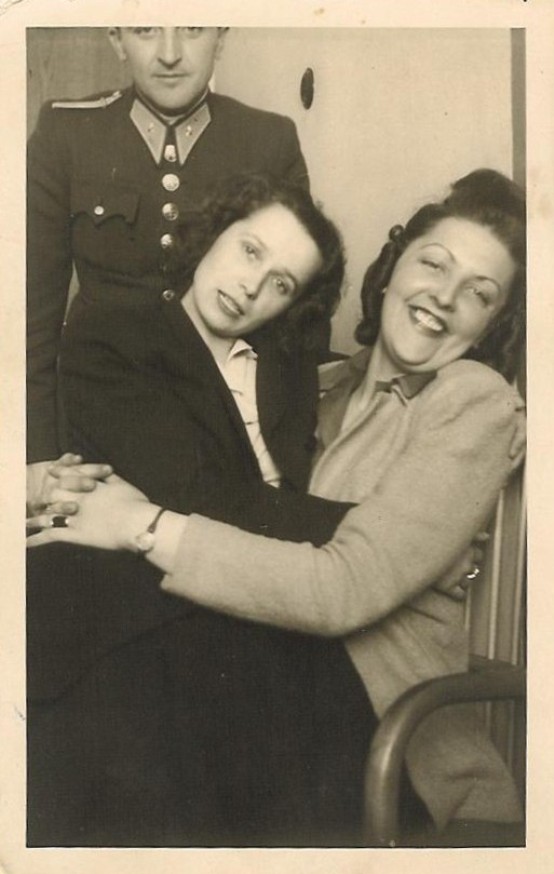
Lieutenant of cavalry Aladár II. Ondrejkovics Sandor de Szlavnicza, wife of Dr. Ivan Milec (Milecz de Tarnó) Slovak ambassador in the Kingdoms Romania and Yugoslavia Mrs Milena Milec born Slezáková and Ms Magdalena Ondrejkovics-Sandor. Diplomat od r. 1919 Dr. Ivan Milec (Milecz de Tarnó) bol spolužiak a priateľ Dr. Aladára I. Ondrejkoviča (Sandor de Szlavnicza) na právnickej fakulte v Budapešti. Snímok z roku 1942 pred emigráciou pani Mileny s manželom vyslancom Dr. Ivanom Milecom cez Maďarsko, Rumunsko, Juhosláviu a Istanbul do Londýna.

Ali Androvič-Vážsky (1919). Alojz Androvič own name, born. 07.09.1919 in Trenčín, Doctor of Medicine. Areas of interest poetry. Father Colonel Alojz Androvič *06.04.1897 Budapest †? Bratislava. Sister Elenka Androvičová - Švančarová lives in Bratislava. He studied at a grammar school in Trenčín and Prague, where his father reassigned of VII Corps Headquarters in Trenčín on 2nd Section Chief of Staff Czechoslovak army in Prague. Here in Graduated 1938 and also began to study medicine at Charles University in MF. In 1939 they returned to Slovakia. Father served in the Slovak Defence Ministerium, and he continued his studies in the years 1939-44 to Komenius University MF in Bratislava. After his studies, and after military service, he worked as a doctor in Nitra, from year 1947 worked on the nervous clinic in Bratislava, from 1950 head of the neurological clinic in Trnava, since 1956 head of the Czechoslovak neurodevelopmental department state spa in Piešťany and from 1963 chairman of the Hospital KUNZ Sokolovce. In 1968 he emigrated to Switzerland, he worked as a psychiatrist in Bern. Author of poetry collections and torsos Fairy tales past (and were characterized poetism both superrealism of year 1941) Monologue with flower (1942) and the next, and the Rosary Catherine Letter painful (both 1944) are charekteristické inclination to spirituality. After 1945 the literary stop. His father was released in 1948 from the Czechoslovak Army. Allegedly subsequently worked in post foreman in factory Dimitrovka. Live to old age (over 90). Engineer architect Stefan Androvič was the son of Stefan Androvič brother of Colonel infantry Alojz Androvič ;
Person of Galanta
before 115 years was born (*14.12.1889) Karol Androvič, publicist, officer. After passing notary course Szombathelyi work as under-notary in Terchova as notary in Rosina, in the years 1929-1933 in Galanta, in the years 1933-1940 was head secretary of notary of Sered, after in Lower Hričov and in Bošany. Published poetry and articles in press. He worked in solving economic problems in district Galanta and Sered. Union vice president was off notars in Slowakia and functionaris Nationaleconomic county in Trnava, in the years 1918-1919 member of Slowak national comitee in Martin.
In 1945-1946 Augustín Androvič VP 1948-1949, MP miestnej správnej komisie v Žiline.
Grandson of Lt. colonel Aladár II. Ondrejkovič Liber Baro Sandor de Szlavnicza is Michal Ondrejkovič. In the years 1998 - 2005 deal with Judo. He was a member of the club Slavia STU Bratislava, which in the 2003/2004 season he became Champion of Slovakia in the 1st League of the Slovak Union of Judo ;
Notes: Alexander Paulus Gallus Androvics (*16.10.1813 Fačkov †26.12.1879 Motešice) cultural worker, politician and lawyer. Signatory Vienna Memorandum Words. (*16.10.1813 Fačkov †26.12.1879 Motešice) parents his krst. parents Paulus Zittnan and Paul. Kon... Ken...Fran... Zittnan his wife Juliana Litter, cultural worker, politician and lawyer. Alexander Androvič was Supremus iudex in the Púchov after Judge in Trenčín. Alexander Jaroslavus *07,08.1856 Púchov parents Spectabilis Dominus Alexander Androvič E.R.Judex Nobilium Da Antonia Kolkovič R.Cath. Bapt.par. Franciscus ... ovič a Theresia Kolkovič E.R. offio Vidna Arigo ;
Source: Moravian eagle, the date of the printout 01/13/1880 ; 36 Olympics Cross Country - Part I ; 36 Olympics Cross Country Footage, Part 2 ; Slovak magazine "New World" of November 1936 ; Lt. colonel tank. Aladár Ondrejkovič ; Karel prince Schwarzenberg ; Mrs Mirjana Šišoláková born Vrbacká ;
♫ Štefan Hoza - Gypsy, what he sings your song? ♫ Wenceslas Patient ♫ Franz von Suppé: Light cavalry ♫ Next the Danube feather dress - František Zvarík ; Olympics Cross Country - Part I 1936 ; Olympics Cross Country Footage, Part 2 1936 ;
















_____k__pia_____k__pia_____j1.120708_180643_23.jpg)








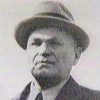







 back
back 
